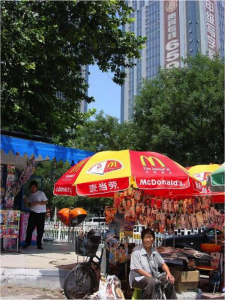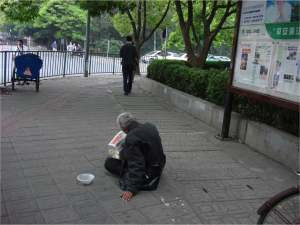Memo #131
By Yuezhi Zhao – yzhao [at] sfu.ca
 On January 9, 2012, the People’s Daily led with a glowing feature celebrating Chongqing’s attempts to achieve “common prosperity.” 30 years of market-driven reform, “letting some people get rich first,” has created one of the most unequal societies in the world. Chongqing’s innovative strategies have deep implications for China’s future, and an intense debate is currently playing out in Chinese media, old and new.
On January 9, 2012, the People’s Daily led with a glowing feature celebrating Chongqing’s attempts to achieve “common prosperity.” 30 years of market-driven reform, “letting some people get rich first,” has created one of the most unequal societies in the world. Chongqing’s innovative strategies have deep implications for China’s future, and an intense debate is currently playing out in Chinese media, old and new.
The well-known leftist website “Utopia” immediately posted the Chongqing story. Utopia was launched as a neo-Maoist response to then Party General Secretary Jiang Zemin’s crackdown on leftist print journals. Along with other leftist websites, it has been a thorn on the left flank of the party. Utopia attacks the party’s deviations from the socialist path and its socialist legacy. They have hailed the “Chongqing model,” while relentlessly attacking the “Guangdong model,” with its sweatshop- and export-driven growth. Opinion is divided, even in market-oriented and liberal intellectual supported media outlets of Guangdong, as seen in the influential Nanfang Daily group papers.
One month later, debates over the future of the “Chongqing model” have taken an intriguing turn. In social media, rumours are flying over the personal and political fate of Chongqing Deputy Mayor Wang Lijun and by implication, Chongqing’s top party leader, Bo Xilai. The famed gangbuster Wang took a sick leave due to stress according to official media.
This smaller debate is part of a much broader discussion about the future of China. As China gears up for the 18th Party Congress, debate is apparent throughout the Chinese communication system, from official party organs, People’s Daily and CCTV, to micro blogs, personal email lists, and mass SMS messages via cell phone.
Covert and overt debates on the future of China in the media are not new. It was a highly philosophical debate on “truth criteria” that helped to dethrone Mao and legitimize Deng’s economic reforms over 30 years ago.
Throughout the 1990s and 2000s, media debates, often triggered by sensational media coverage of scandals, have played an instrumental role in shaping China’s reform path. With the explosion of the Internet and social media, the scope, ferocity, and stakes of these debates have intensified, creating intricate dynamics between elite, intellectual, and popular politics. Western media portrayals of Chinese media and Internet as plagued by “censorship” still ring true, and we will see more crackdowns. But one-dimensional portrayals miss much of what is going on inside China’s increasingly diverse, dynamic, and perhaps even decisive, media and cyberspace.
About the Author:
Yuezhi Zhao – Canada Research Chair, School of Communication, Simon Fraser University. Author of China in Communication: Political Economy, Power, and Conflict.
Links:
- Communication in China: Political Economy, Power, and Conflict, March 2008. (Book by Yuezhi Zhao).
- Communication, the Nexus of Class and Nation, and Global Divides: Reflections on China’s Post-Revolutionary Experiences, Nordicom Review, June 2009.
- Surprises Loom: An Uncensored Chinese media might illuminate a citizenry that is both anti-Western and anti-capitalist, Vancouver Sun, May 2008.
- China’s battle to dominate global journalism, Radio86, February 2011.
Related Memos:
- Our other Memos about China
- American Tutelage, Chinese Disillusion, and the “Turning Point” in Early 20th Century Chinese Journalism by Pacific Affairs (Memo #6)

